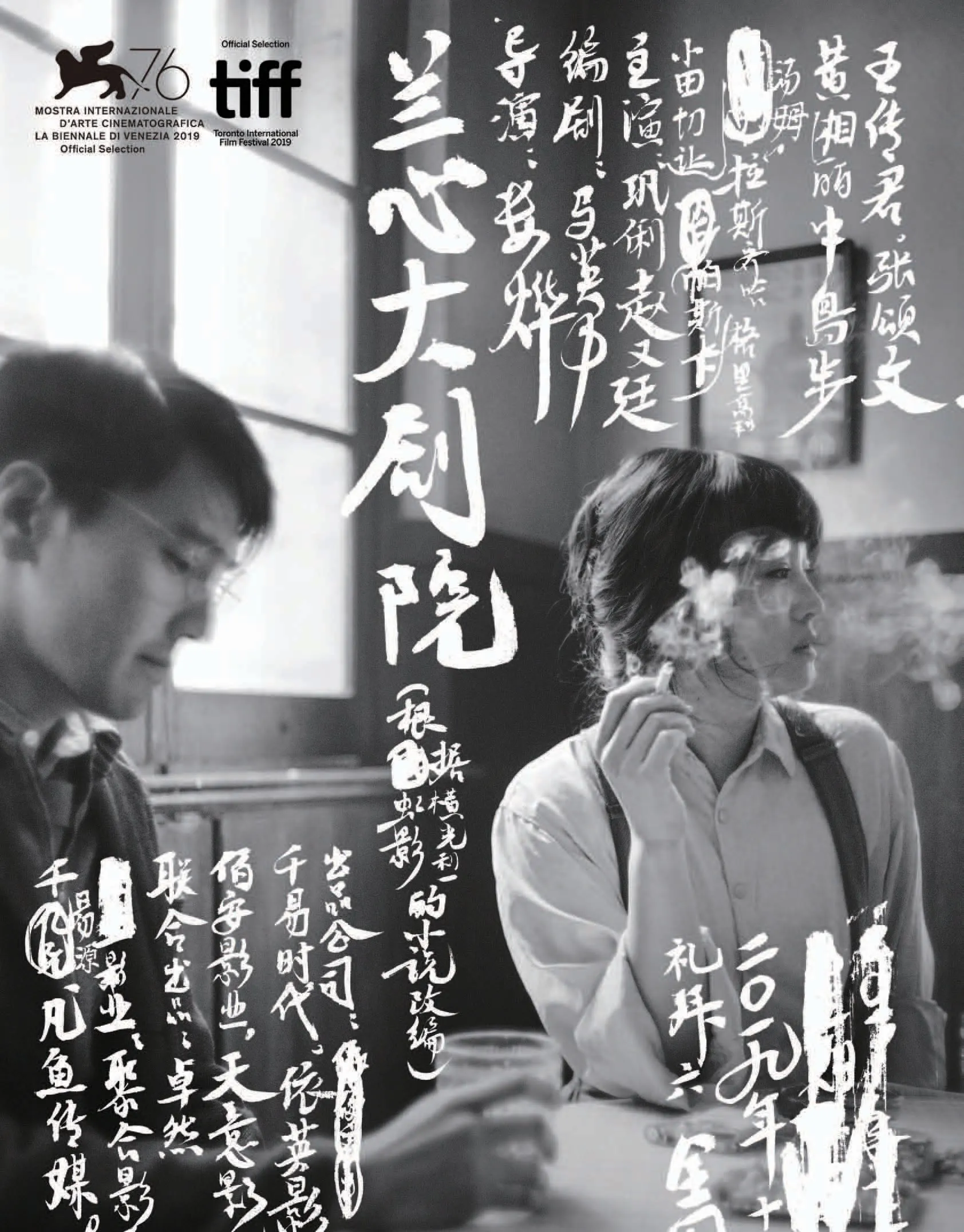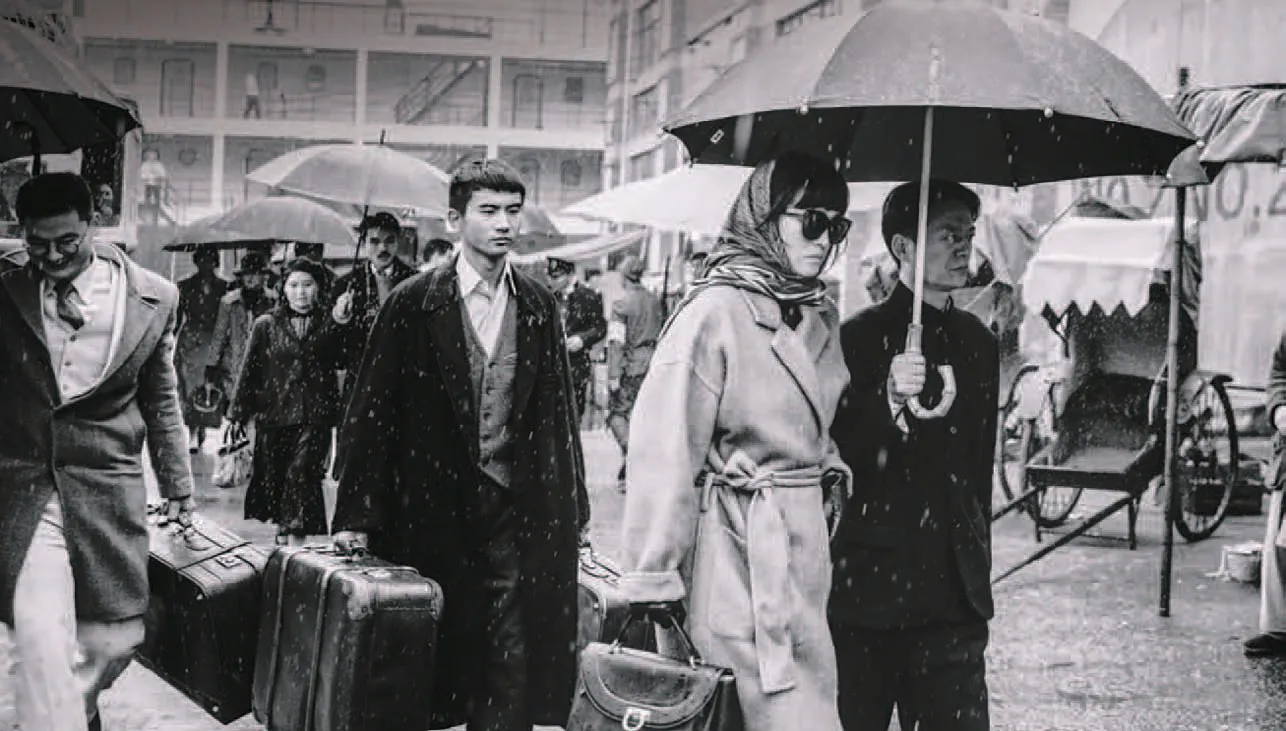SATURDAY FICTIONI

A SPY IN S H AN G H AI
After the cancellation of its planned high-profile premiere due to vague“internal production problems” in 2019,Saturday Fiction(《兰心大剧院》), a black-andwhite thriller, finally hit Chinese big screens on October 15.
Director Lou Ye oversees a cast of internationally-renowned stars,including Chinese film icon Gong Li, in a combined adaptation of the novelsDeath in Shanghaiby British-Chinese writer Hong Ying andShanghaiby Japanese author Yokomitsu Riichi. The film revolves around actress Jean Yu (Gong),returning to Shanghai to star in a play,Saturday Fiction, directed by and costaring her old flame Tan Na (Mark Chao) in 1941 during the Japanese occupation.
Various parties are inexplicably keeping close track of Jean’s movements, including the obsequious manager (Tom Wlaschiha) of her French Concession hotel, who taps her phone. Speculation abounds in Shanghai society about Jean’s ulterior motive for returning to the city, ranging from rekindling her love with Tan to rescuing her ex-husband (Zhang Songwen), who is being held in a Japanese prison. As the movie unfolds,Jean is revealed as a spy for the Allied Powers, but her loyalties are far from clear-cut.
The film reflects a more commercial turn in Lou’s filmmaking oeuvre. The 1965-born director from Shanghai, has been known for dark documentary-like films full of sex, violence, and death.His works seldom venture into the mainstream, and are rarely box office successes. Nevertheless, previous works likeSuzhou River(2000),Purple Butterfly(2004), andSpring Fever(2009) earned him much international prominence.
But despite his critical success in Europe—Saturday Fictionwas nominated for the Golden Lion Award at the 76th Venice International Film Festival—Lou’s offering has been met with lukewarm audience numbers and mixed reviews. The movie has a decent but unremarkable score of 7.3 out of 10 on China’s most popular film reviewing platform, Douban. It attracted less than 500,000 moviegoers in its first three days, much lower than expected.
Lou follows the play-within-a-play narrative style of the original novels.The movie begins in a rehearsal, with Jean playing a strike leader of the patriotic “May 30th Movement” of 1925 against the Japanese and the Beiyang government, alongside Tan as the male lead. In an interview at the CineCina film festival in 2020, Lou clarified this is actually a hint to the audience from the beginning that space and time are confused in the film.
By adopting handheld cameras,shaking slightly as the action plays out, Lou injects the turbulence of this uncertain age into each shot, creating a world in which crisis may break out at any moment. It is perfect for the tense gun-toting finale, which feels so immersive that the theater audience might think they have to dodge some bullets themselves.
Chinese film elites are pleased. In a paper published in Chinese academic journal Movie Review, Professor Zhang Yan of Beijing Normal University, and Ran Yuguo, a postgraduate student,praised the film’s in-depth focus on the psychology of its female characters,which “means the film is far more than an espionage adventure.”
The subplot between Jean and Bai Mei (Huang Xiangli), a Kuomintang spy tasked with finding out Jean’s hidden motive, does indeed make the film special. Their initial relationship based on mutual exploitation—Jean not fooled by Bai in the slightest—later evolves into mutual support when they find they share a passion for acting and had similarly lonely childhoods as orphans.

Jean Yu (Gong Li) returns to Shanghai, drawing attention from media and various parties
The women have no choice in their assigned identities in this age of conservative gender norms, but that doesn’t mean they can’t rebel and pursue what they really desire. Bai refuses to betray Jean and aspires for an acting career, while Jean desires to end the war, eventually going against her role and her French foster father Frederic Hubert (Pascal Greggory),himself a spy, by withholding information about Japan’s plans to attack Pearl Harbor. These women’s courage to rebel originates from their powerful, mutually supportive relationship.
However, not everyone sings praises for Lou’s film. Its bold aesthetic choices make for difficult viewing. “I feel dizzy and lightheaded due to the shaky camera. I seldom got a clear moment to watch the performance of the actors and to contemplate their faces,” Wang Qi, a student in Tianjing, tells TWOC.Critics also took aim at the shallow characterization and weak plot,despite the veneer of complexity. For example, why is Jean’s ex-husband being held by the Japanese, and why is her plan to rescue him riddled with so many flaws? Without these explanations, Jean’s ex-husband only seems to be there to propel the story along.
Saturday Fictionpromised so much:an espionage story of romance, action,and betrayal, all the ingredients to keep audiences entertained and the box office stuffed full. However,the plot and visuals are regrettably undermined by Lou’s pursuit of provocative arthouse aesthetics,making it hard for the film to pull at the heartstrings of Chinese audiences.

